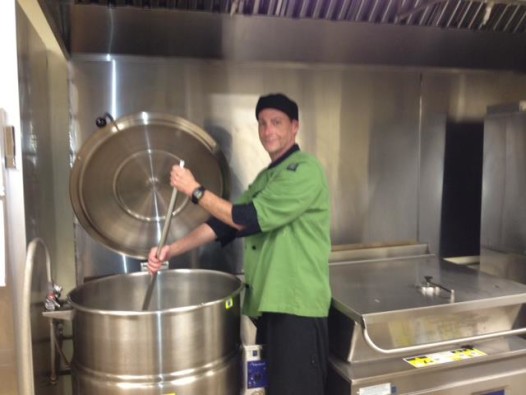
In partnership with New Orleans Food and Farm Network, Edible Enterprises serves as a food incubator, providing a shared commercial kitchen to local food producers.
New Orleans is a quintessential survivor. Ten years after Katrina, New Orleans is globally recognized as a symbol of restoration and resilience. As our city endures, it evolves. It refashions and redesigns, because that is how it survives. Yet skillfully and consciously, it never loses its vibrancy, its soul.
Executive Director of New Orleans Food and Farm Network (NOFFN) and Edible Enterprises — local organizations aimed towards creating and supporting the building blocks for a new food economy in New Orleans — Sanjay Kharod calls this the “Changing Same.” The mantra encapsulates the ability to hold onto an original spirit, motivation, or goal, while simultaneously adapting, rethinking and considering what else needs to be done.
Kharod, through NOFFN and Edible Enterprises, works to grow the local New Orleans food economy, an aspect of our city that is challenged, in a way, by resistance to this “Changing Same.” We live in a food culture and in an agricultural state, yet our agriculture is, in many ways, currently disconnected from our food culture. We may often assume that our established food systems are need no rethinking.
Today, there are no seasons in the American supermarket. You can buy apples year round, grown halfway around the globe, picked when green, ripened with ethylene gas, and then shipped hundreds of miles away. We accept new technological discoveries as progress, but one does not always inform the other.
Perhaps, in order to survive, adapt and move forward, New Orleans also had to step back from agricultural technology.
Currently, 80-90% of our food is produced in California, an unreliable food source currently plagued with drought. It’s evident that California cannot sustain its production for the rest of the nation, but we still require our food to travel 1500+ miles to reach our plates. So, what if we started growing a bulk our food right here in New Orleans?
“If we want to have a resilient food system, we have to think about the food system we want in the future,” Kharod says. “We have to start building it now.”
Many New Orleanians, like Kharod and his ventures, are revamping time-tested, traditional methods in order to put locally grown and produced foods back on our plates.
“There are really creative people working to make an entirely different food infrastructure than what we’re used to,” Kharod says.

partnership with New Orleans Food and Farm Network, Edible Enterprises serves as a food incubator, providing a shared commercial kitchen to local food producers.
Of the new infrastructure, Kharod explains we first need more local farmers and consumers to support these farmers. Next, we need food entrepreneurs to package, preserve and turn the locally grown food into value-added food products, such as flour and jam. Lastly, we need a place for these local products to be sold.
NOFFN and Edible Enterprises are each key ventures necessary to actualizing all three components of this alternative food economy. NOFFN works to increase markets for farmers, incubating farms, training new farmers. Edible Enterprises, a local food incubator, functioning as a shared, affordable and fully stocked professional kitchen space at which local food entrepreneurs prepare their unique foods for mass market sales.
With the resource of Edible Enterprises, Local food venture Cocktail & Sons, for example, buys raw sugar from Three Brothers Farm in Youngsville, LA; creates their handcrafted cocktail syrups in the Edible Enterprises kitchen; and then sells their product through local vendors such as Good Eggs and NolaCajun.com. As farmers sell their yield to emerging food entrepreneurs, who in turn sell their goods to the public, public access to local food products is restored, and an entire economy around food is generated.
“Edible Enterprises is a tool,” Kharod says. “It’s not mine, it’s ours. And we should use it. We can have farmers selling their products to entrepreneurs and both of them making a living off of it. It’s pretty amazing equipment. It’s how to start a business.”
Louisiana is rich with farmland. Instead of shipping our agricultural products out of state and relying entirely off those from other states or countries, NOFFN and Edible Enterprises foster a local food economy that has shorter supply chains — from local farms to packing and production facilities to retailers — and a shorter distance from farm to fork, enhancing food quality and security.
By rethinking the way we use our farmland, agriculture and local food products, “we are going forward with the knowledge we forgot” Kharod says. This is how we will be resilient – we will innovate utilizing the resources that we already have, and in doing so, we will progress, and together, in a way that is uniquely New Orleanian, we will succeed.
 NOLAbeings Multimedia artist Claire Bangser created NOLAbeings as a portrait-based story project that marries...
NOLAbeings Multimedia artist Claire Bangser created NOLAbeings as a portrait-based story project that marries...  Voodoo in New Orleans: Reviving history: New Orleans fortune telling This article takes a deep dive into the history of Voodoo in New Orleans, its hybridization with Catholicism, and its present-day place in the city's culture. The author visits fortune-tellers in the French Quarter, using their guidance as a tool for introspection rather than a deterministic predictor of the future. Through her experiences in New Orleans, the author feels a mystical connection to both the past and the future.
Voodoo in New Orleans: Reviving history: New Orleans fortune telling This article takes a deep dive into the history of Voodoo in New Orleans, its hybridization with Catholicism, and its present-day place in the city's culture. The author visits fortune-tellers in the French Quarter, using their guidance as a tool for introspection rather than a deterministic predictor of the future. Through her experiences in New Orleans, the author feels a mystical connection to both the past and the future. 